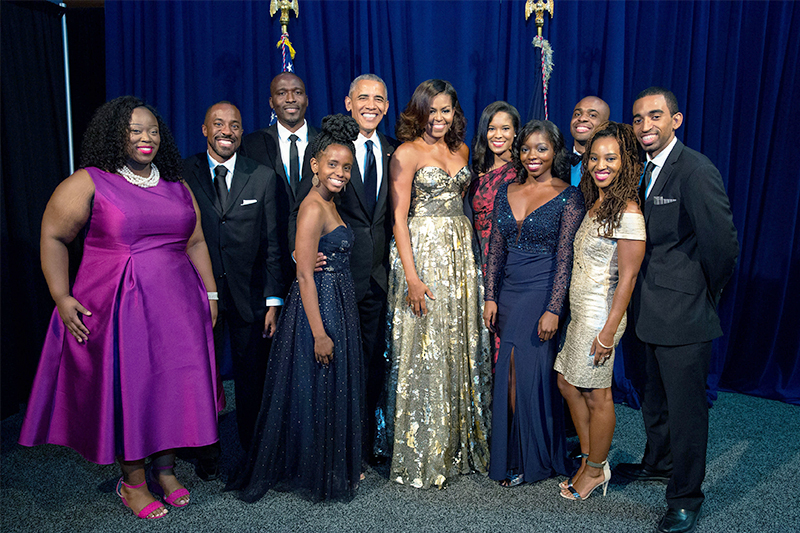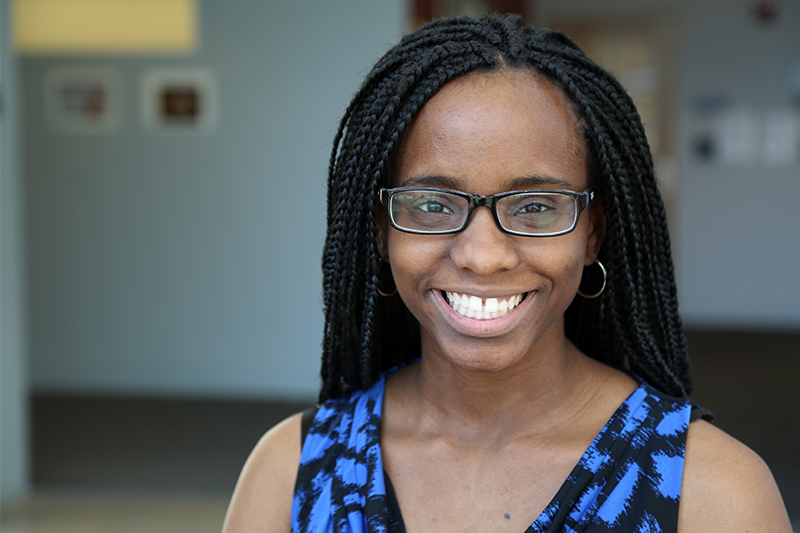An interview with Erin Robinson, MPP’16, legislative fellow for the Congressional Black Caucus Foundation, Incorporated in U.S. Sen. Cory Booker’s office
By Bethany Romano

Erin Robinson, MPP’16, center left with President Barack Obama, First Lady Michelle Obama, and the 2016 cohort of Congressional Black Caucus Foundation, Inc. Fellows. Photo credit: Congressional Black Caucus Foundation, Inc.
Tell me about this photograph.
Well, right now I am a Congressional Black Caucus Foundation, Incorporated (CBCF) Fellow. The CBCF has an Annual Legislative Conference (ALC), and this was taken at the end of this year’s conference at the awards dinner. President Obama was the keynote speaker, so as CBCF fellows we got to meet the president and first lady and take a picture together and talk to him. Secretary Clinton also got an award at that dinner, so we heard her speak as well. And it happened to be on my 26th birthday, so that was pretty perfect.
When the president came up to me—I had been practicing this all day—I looked at him and said, “I just turned 26, thanks for the extended health insurance!” He just laughed at me.
That’s an amazing story! So aside from glamorous awards dinners, what do you do as a Congressional Black Caucus Foundation, Inc. (CBCF) Fellow?
CBCF fellows do two rotations, which is the length of two academic years. The first year you work on a member’s staff on the Hill, so I’m working in New Jersey Senator Cory Booker’s office. My second placement will probably be on a committee. I have the option to be off the Hill, but right now I think I would prefer to stay on the Hill.
What’s an average day like for you in Senator Cory Booker’s office?
Right now I’m working on Senator Booker’s education and criminal justice portfolios. So day to day I write a lot of memos—I basically do what I always wanted to do, which is bring research to policymakers. I read reports from think tanks and non-profits, and I write about what’s happening in the field to inform the positions we take on things.
I’m currently working on a bill with our deputy counsel. He really trusts me to do the work. I was in week three of my fellowship and he asked me to think of additional provisions to add to our bill. It’s amazing to see things that I suggested—such as the importance of trauma-informed practices when providing services to justice-involved individuals—being incorporated into legislation. I read the new version of our bill yesterday and I know it’s nerdy, but I shed a few tears just seeing my ideas within a piece of legislation in the United States Congress. Who knows how far it will go, but I am just so grateful to even be part of the process.
I recently met with a group of community college students from New Jersey. It was the first meeting I’d taken alone. They spoke to me about their goals for funding community colleges and how they wanted Senator Booker to be involved. They were amazing at advocating for themselves and their fellow students. I wrote a memo about their concerns, but what was most fun for me was connecting with them. Once the official part of our meeting was over, they asked about how I’d gotten to this point and what advice I could give. When they were leaving, their faculty advisor told me this had been their best meeting yet and that they really enjoyed meeting me. That was one of my favorite days on the job so far. I helped these students make their voices heard. This is exactly what I want to be doing.
What’s it like working with Senator Booker and his team?
I’ve been following Cory Booker’s career since he was mayor of Newark, and I’ve always thought highly of him. It turns out he’s just really the person I thought he was. He’s full of integrity. During the annual legislative conference I got to ride in the cab with him briefly and we got to talk for a little bit. He had just given a panel on small businesses and entrepreneurship, and he asked me, “How did you think I did?” I couldn’t believe that Senator Cory Booker was asking me that. But he takes staff input seriously, which I appreciate so much.
And that goes for the rest of the team as well. We have an amazing chief of staff. I feel really blessed to work with the people I work with. Not only are they supportive, they want me to learn, they’re encouraging me to go to different events, to increase my knowledge not just in my subject area but in other areas I might be interested in.
What parts of the MPP program helped prepare you for this job?
Writing memos! I do that literally at least once a week. Being able to turn things around quickly is important as well. For example, when Senator Booker has a meeting, I might give him a memo as a refresher on what will be in the meeting. So that practice of writing short pieces and being able to do it in a short period of time was really helpful.
I also appreciate the breadth of social policy topics I was exposed to at Heller—the other day a woman from the Center on Budget and Policy Priorities sent me some new research they’ve been doing on the earned income tax credit and the child tax credit, and these are things we talked about in class. I feel versed in what’s going on, I can speak the language and I know what family policy is concerned with today. I don’t feel behind.

Do you have any advice for current or aspiring Heller MPP students?
Take the memo and op-ed writing seriously, and by that I mean really focus on getting the most information possible in those kinds of writing assignments. It’s not just for a grade—those skills will come in really handy. Sometimes when you’re stressed out, you’ll get to the point where you think “okay, it’s just a grade, I just have to get this assignment done,” but honing those skills is really important.
Also, don’t discount the value of group projects. I’m working on a bill right now with our deputy counsel, and because I’ve done group projects before I know how to pay attention to the way he works and I can adapt to that, to meet his expectations and to make it easier for our process.
Any final thoughts?
I’m just excited to be on this team because I feel like I’m working for a member of Congress that I really believe in, and who has goals that align with mine. That makes me really excited.
The collaboration of all the different groups that goes into writing a bill is exciting for me. Right now I’m working on a bill with our deputy counsel, and we’re working with the Congressional Research Service to confirm the constitutionality of it, we’ve worked with different stakeholder organizations to make sure their voices are heard. To see how many people and different groups are involved in this gives me hope that we are including the voices of the people affected by these policies. That’s what makes me excited.
That’s my number one career goal: to serve as a bridge between people on the ground and the policymakers. So much can change from the halls of Congress to a classroom or social service agency. The importance of the implementation process and the centrality of street level bureaucrats is something I learned at Heller.
It sounds like this job has built up your faith in the democratic process.
Yes, definitely, and it’s so good to see.
